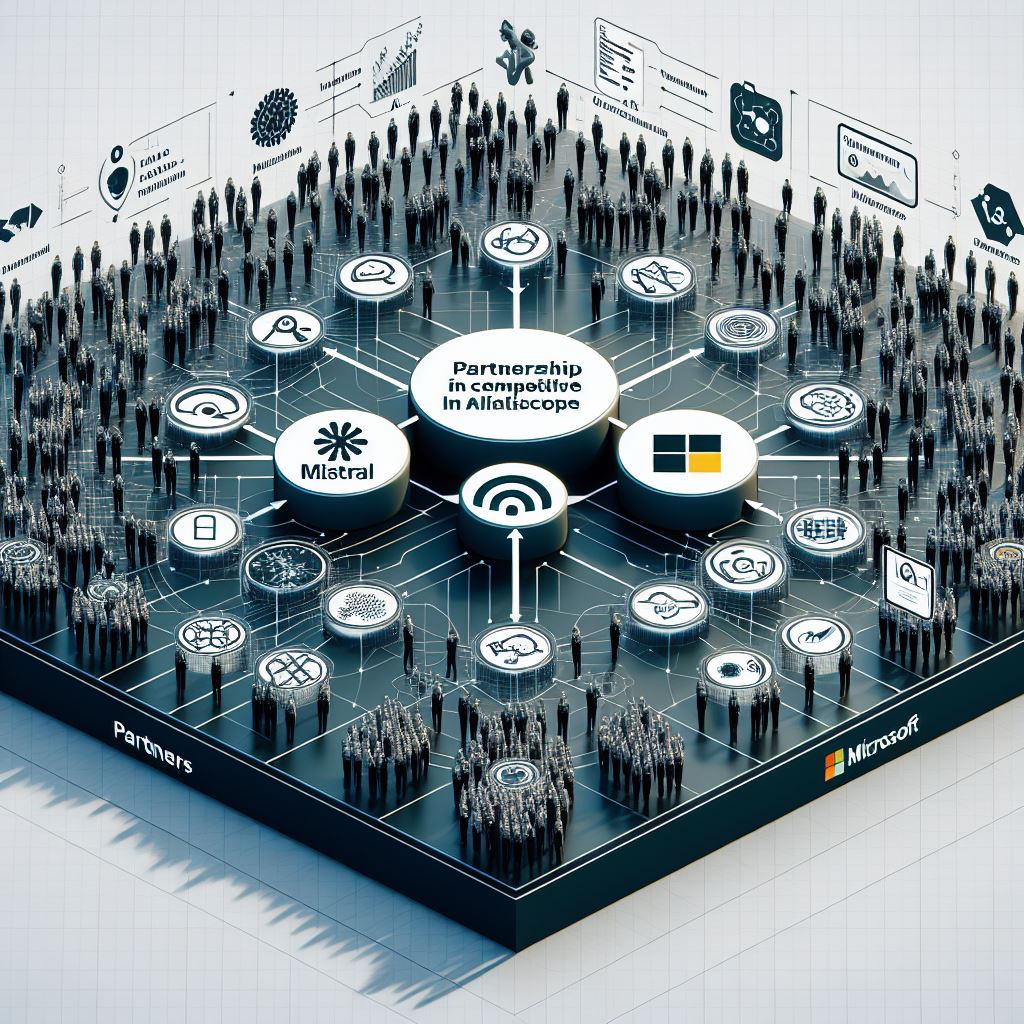How Mistral’s Partnership with Microsoft Secures its Future in the Competitive AI Landscape

AI is causing unprecedented changes that are both creating new opportunities and transforming individuals, businesses, and society. The current AI landscape is characterised by increased competition and dependence on a small number of dominant players. These players have the talent, resources, data, and a willing mindset to reach into their deep pockets to succeed. As each European AI player hopes to have greater control and influence over its own AI destiny, this presents a threat to their nation’s strategic autonomy as well as possibly to the EU as a whole.
The recent announcement of Mistral, a French leader in AI, partnering with the U.S. technology giant Microsoft does not spell an abandonment of the French quest for strategic autonomy. I would argue it is a pragmatic approach to ensuring its survivability, profitability, and leadership in France and Europe.
Google and Microsoft have indeed positioned themselves at the forefront of AI research and development, leveraging their vast resources, extensive data repositories, and cutting-edge computing infrastructure. This dominance is a function of both their financial muscle as well as their strategic foresight in recognising technology’s transformative potential across industries and society.
The landscape of global AI innovation, particularly its concentration in US firms, presents a nuanced challenge and opportunity for Mistral, which seeks to take the lead in championing France’s strategic autonomy ambition. Understandably, it wishes to follow a path that is less reliant on external powers and more reflective of French and possibly European values and interests. Looking out Mistral’s windows in Paris is a battleground and a breeding ground for creativity. The dominance of US companies in AI raises the bar for technological innovation and market penetration. However, it also identifies a clear possibility for differentiation based on values, regulatory compliance, and strategic alignment with French and European autonomy and resilience objectives. The European Union’s emphasis on privacy, ethical standards, and regulatory environment, as shown by the General Data Protection Regulation (GDPR), is a unique proposition that European AI businesses can use to differentiate themselves from their American counterparts.
Achieving strategic autonomy is difficult and non-linear. Is the EU AI Act a unified strategy among EU members? The necessity for significant investment in R&D, as well as the imperative to close the technological gap with global leaders, are formidable challenges. Furthermore, the EU’s approach to AI in defense and security lacks strategic focus and operational readiness, underscoring the challenge of integrating AI technology in a way that improves strategic autonomy. In this scenario, a European AI leader seeking greater strategic autonomy must negotiate a complicated ecosystem, innovate within the EU’s demanding regulatory framework, and bridge the gap between technology and capability while contributing to the EU’s broader strategic objectives. This is a dance that involves not only technological innovation but also strategic alliances in Europe and around the world, all to improve the EU’s position in the AI environment. Mistral’s role is to push the boundaries of AI innovation, comply with French and European principles and legislation, and contribute to the strategic goals of its country and the EU.
It is critical to understand that partnerships between companies from different geopolitical realms are more than just transactions; they are strategic alignments that can serve multiple purposes. Mistral’s partnership with Microsoft could provide access to advanced technologies, larger markets, and significant resources. The difficulty, however, is to use the collaboration to strengthen its strategic autonomy rather than becoming subordinate to Microsoft’s objectives.
The realm of values and regulations serves as a differentiator and a means of keeping some semblance of autonomy. The GDPR embodies European entities’ long-standing commitment to privacy, ethical AI use, and strong data protection regulations. By incorporating these values into the core of its products and services, Mistral can not only differentiate itself in the global market but also appeal to consumers and businesses that are increasingly concerned about privacy and ethical considerations.
Furthermore, focusing on niche areas where Europe has a competitive advantage or on sectors that are underserved by U.S. tech giants could offer another differentiation strategy. Specific artificial intelligence applications specific to French healthcare, agriculture, or environmental sustainability could be part of this strategy and aligned with European societal values and political priorities.
Strategic partnerships within Europe and with other global players could also elevate Mistral’s position. By forming alliances with other European tech firms, and research institutions, and leveraging EU funding mechanisms, it can contribute to and benefit from a collective effort to advance European technological sovereignty.
Mistral’s ability to differentiate itself while partnering with Microsoft is dependent on its ability to strategically leverage the partnership for growth and innovation while adhering to European values and regulatory frameworks, and actively contributing to France and Europe’s strategic autonomy in AI.
How can Mistral’s seemingly sudden change of sentiment be transformed into a strategic advantage, especially as it navigates the complex and competitive AI landscape that is predominantly American?
Its previous position of opposing U.S. big tech can catalyse innovation, driving the company to develop unique AI solutions that address gaps left by U.S. firms. This could involve focusing on niche markets or sectors where French or European companies have a competitive edge or societal values that demand a different approach to AI applications.
Finally, Mistral has a unique vantage point, straddling the technological and regulatory environments of both France and the United States, offering a fertile ground for cultivating a distinctive competitive edge. This dual insight, leveraged astutely can propel it to not only thrive in its local and EU markets but also carve out its share on the global stage.